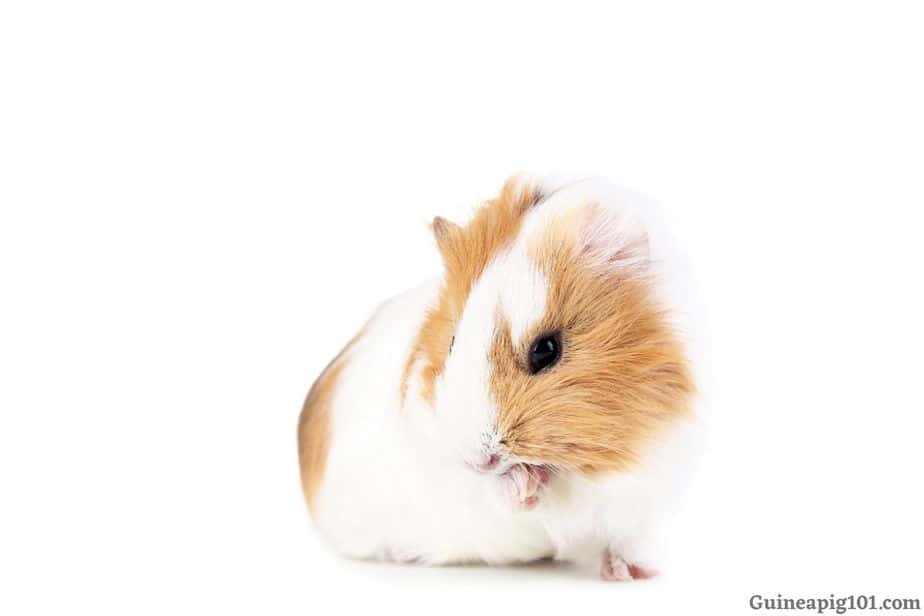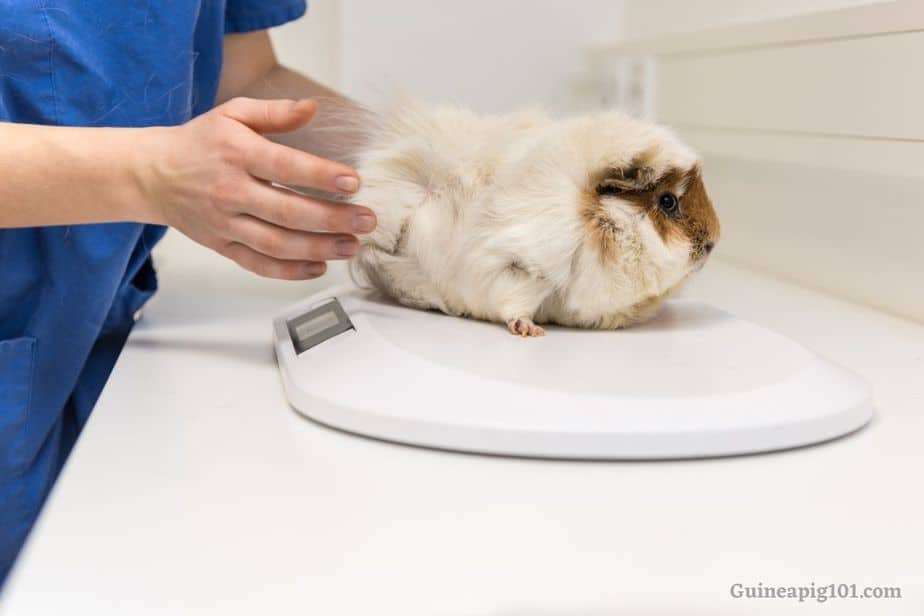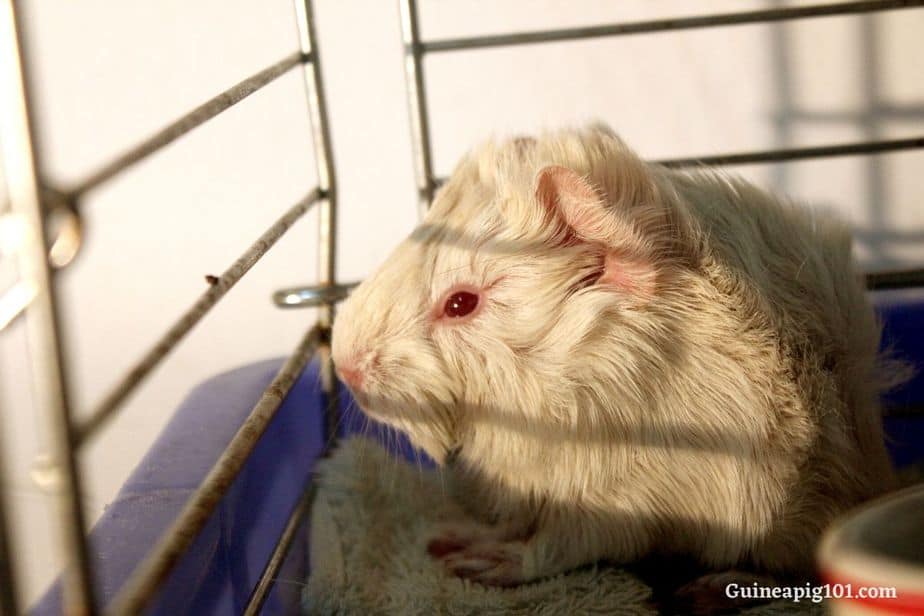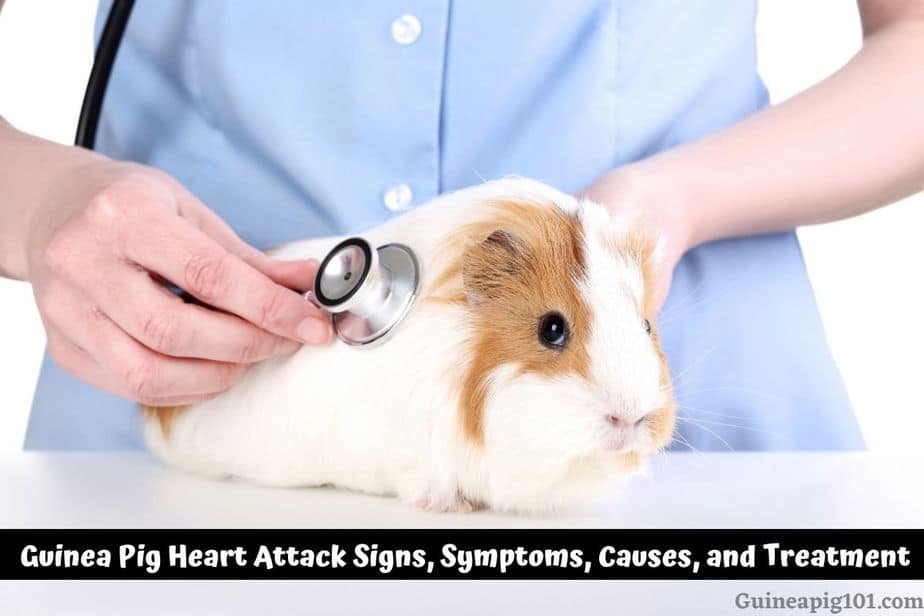The risk of guinea pig heart attack or any other heart disease increases with the increase of its life expectancy. There is a probability that we will not be able to detect any symptoms in the earlier stage. Unfortunately, this means that by the time we detect the problem it is already at an advanced stage with a lot of complications.
Heart disease can be challenging to detect as guinea pigs do not show any symptoms at early stages. However, some guinea pigs do show some symptoms like fatigue, breathing problem, etc. Your guinea pigs may have difficulty in breathing, losing weight, or have deteriorating coordination.
Guinea pigs can have a good life after facing heart disease just by proper treatment and care.
Taking them to the vet should be the first step after detecting such an issue so that the vet can eliminate the cause with adequate medication.
The owner of guinea pig also plays a very vital role in helping guinea pig from coming out from this by providing some special care.
These include assisting in stress reduction, managing a proper and nutritious diet for their guinea pig so their guinea pig doesn’t have to face a problem of weight management which is a major factor of a heart attack.
Can guinea pigs have heart attacks?
Heart disease is a significant concern among guinea pigs, especially those who are above four years old.
A guinea pig can also suffer from a heart attack at a young age depending upon their health condition.
An average lifespan for a guinea pig is around six years old. However, it comes with a significant risk of diseases like GI Stasis, Heart problems, etc.
As we came to know from the above information, we may not be able to detect heart disease at an early stage because guinea pigs show symptoms very gradually. Thus, we must be alert at all times.
Detecting heart attack
There can be minor changes in guinea pig behavior such as unwillingness to move or lack of enthusiasm, and a minor weight loss.
But all this can be ignored because it is not a significant problem, which indicates that guinea pigs have heart disease.
When heart disease of your guinea pig comes to a further stage, you may notice your guinea pig struggling to breathe and losing appetite. Sometimes guinea pigs can also get occasionally faint.
The body is not able to circulate the blood to the heart when the blood clot blocks the flow of blood to the heart, and because of this tissue loses oxygen, and in this stage, your guinea pig has congestive heart failure.
There are different reasons for a guinea pig to go through a heart attack, which includes a diet rich in fat, lacks nutrients, and not being physically fit, which can happen when they live in a small cage without exercise.
When you detect that your guinea pig has started showing some symptoms, the very first thing to do is take your guinea pig to the vet so they can examine your guinea pig heartbeat for a heart murmur.
A guinea pig standard heart rate is 240 to 250 beats per minute, and a healthy respiratory rate is 45 and 105 breaths per minute.
The heart rhythm doesn’t need to be always detectable in heart disease, but if it is, then it will help the vet provide the right treatment to your guinea pigs.
Taking your guinea pig to the vet can also be beneficial as if there is any breathing problem, then it can be solved by oxygen support, or likewise, other symptoms can also be improved.
How can you tell if a guinea pig is having a heart attack?
A heart attack or any heart disease can be easily detected if we take the early signs seriously.
Early symptoms include breathing problems, unwilling to move, etc.
Unfortunately, these signs resemble other health conditions as well, so there is a possibility that we don’t take them as seriously as we should have.
Signs of heart disease in guinea pig

In many cases, we cannot detect heart disease in guinea pigs as they show the symptoms very gradually, or we can say that many guinea pigs are asymptomatic.
They show signs or symptoms when the disease reaches a further stage or sometimes the last stage. The most common symptoms guinea pig shows of an oncoming heart attack include:
- Weight loss
- Cough
- A physical change like lack of energy and enthusiasm
- Heart murmur
- Chronic upper respiratory infections (URIs)
- Fluid in the lungs
- Eating pattern get change- Loss of Appetite
- Heart rate gets fast
- Malocclusion
- Enlarged heart on x-ray
- Weakness
Clinical symptoms may take a long time to develop and are often non-specific to the situation.
Signs such as lethargy, loss of appetite, and weight can resemble other health conditions. Some guinea pigs also have digestive problems, including diarrhea and bloating.
Eating pattern change
An eating pattern of your guinea pig plays a significant role in detecting if your guinea pig is going through heart disease or in an oncoming heart attack.
If your guinea pig eating pattern gets changed in a very unexpected way or your guinea pig refuses to eat every time, then it can be a significant issue.
In this case, you should always be active to see your guinea pig bowel movement, and if there are any signs of guinea pig not having proper diet, then you should get your guinea pig to the vet for appropriate examination.
Not having a proper eating pattern can lead to a various digestive problem which can be painful to your guinea pig
Note that being a prey animal guinea pig can hide its weakness as it is beneficial in the wilderness to protect itself.
However, it can be a problem as a domestic animal as the owner will be not able to detect that if it’s guinea pig is suffering from any health issues.
An owner should always monitor their guinea pig’s change in behavior, so by judging its behavior, they can detect if there is something wrong with their guinea pig or not.
Guinea pig heart attack symptoms
As the disease progresses, your guinea pig will show some signs such as cough, pain, or aggressive behavior. Your guinea pig’s heart rate increases as their heart have to work harder to supply oxygen to their body.
However, detecting the increase in a heartbeat can be challenging. Thus apart from detecting the irregularities in their pulse, you should also look out for vague symptoms such as your guinea pig’s change in behavior, mood, and eating pattern.
The following signs occur when a guinea pig’s heart is unable to circulate the blood throughout the body. Thus results in tissues losing oxygen, and congestive heart failure occurs.
- Labored respiration: During the critical stage of the heart disease, your guinea pig will struggle to breathe, and because of not getting enough oxygen, there will be a discoloration of their tongue. As the respiratory rate will increase, your guinea pig will start breathing with the mouth.
- Audible inspiration: As the guinea pig’s heart becomes incapable of supplying blood throughout the body at a critical stage, the breathing in the air becomes noisier and hard than exhaling air. Fluids may accumulate in your guinea pig’s lungs and heart which indicates that your guinea pig is suffering from congestive heart failure.
In the acute stage of heart attack, your guinea pigs may lose consciousness. At this stage, they need immediate vet treatment, or they may collapse and pass away.
What causes a guinea pig to have a heart attack?

Numerous factors can cause heart disease to the guinea pig. Some major factors includes:
- A diet rich in fat and lack of nutrients
- Guinea pig living in a small cage without having physical exercise
- Having stress because of environmental factors.
All these can contribute towards cardiovascular diseases.
Stress:
A bad living environment can get your guinea pig in stress, which is a significant factor of heart attack or heart disease.
Having stress increases the chances of heart disease or heart attack. Diseases like heart failure and hypertension are prevalent in animals, including guinea pigs, and fear is a significant reason for all that.
A loud or sudden noise like thunder, lightning, fireworks can make your guinea pig scared, and they can get stressed out.
One of the significant factors of stress can also be the fear of a predator.
Any predator roaming around your guinea pigs cage can make your guinea pig scare as guinea pig doesn’t know that the predator can’t enter the cage.
In this case, because of fear and not able to do something will increase your guinea pig heartbeat.
A small cage with a herd of guinea pigs can also be a factor of stress as it increases the neurotransmitter’s levels called catecholamines in the blood, which can result in dysfunction of the left ventricle.
After all details, we came to know from the above information that stress can be the primary factor of heart disease or heart attack in a guinea pig.
Keeping your guinea pig in a safe spot of your house can reduce such stress as there will be no fear of predators in your guinea pig.
Also, make sure other pets like dogs or cats cannot enter their room as this can also increase the stress level of your guinea pigs.
Lack of exercise:
With a proper healthy diet, adequate exercise is also essential in guinea pig life to ensure that your guinea pig doesn’t gain weight.
Being overweight can also be a significant factor in promoting heart disease or heart failure.
A guinea pig is living in a small cage with a lack of exercise results in being overweight.
Your guinea pig should play and run every day, which can help your guinea pig to be fit, and also playing can make your guinea pig stress free.
Owner of a guinea pig must make sure that the surrounding in which the guinea pig is running and playing every day is stress-free.
However, Doing anything in excess can also harm them; excess exercise can result in a harmful way to your guinea pig, and even a risk of heart attack increases because of excessive exercise.
Finding the right balance of play and exercise is essential for optimum health of your guinea pig.
A Rich-Fat Diet:
A diet rich in fat will result in your guinea pig being overweight, which can become a factor in heart disease or heart attack.
Too many treats and sugar can also cause a heart problem to your guinea pig by affecting their digestive system.
There should be a proper diet plan for your guinea pig. The guinea pig should be given high-quality grass hay and vegetables on a daily basis.
However, The staple diet should be high-quality grass hay as it contains the required nutrients that keep your guinea pig healthy.
Food that contains high sugar and fat like commercial treats and fruits should be served to your guinea pig as a treat in their diet.
Nutrient insufficiency:
Lack of vitamins and minerals such as calcium and phosphorus can lead to heart disease.
Lack of calcium leads to bone loss in guinea pigs, such as lack of vitamin D or E can cause abnormal mineralization of the blood vessels. All this can also make your guinea pig go through a heart attack.
Infections:

Such infections, like toxin-producing bacteria, protozoa, and viruses can also affect guinea pigs with heart disease.
These all infections affect the heart by causing muscle disease, cardiomyopathy (disease of the heart muscle), and endocarditis (inflammation of the inner lining of the breast).
Are guinea pigs prone to heart attacks?
Yes, guinea pigs are prone to heart attacks, especially at a later stage of life.
Risk factors in guinea pig to go through a heart attack includes age, gender, and living environment. Let us have a closer look into these:
Age
- Guinea pigs under the age of four are not prone to heart attacks.
- Heart disease is most common in guinea pigs with older age.
Gender
- The gender of guinea pigs predisposes it to any type of heart disease.
- Spaying or neutering them will also not have any major impact.
Living environment
- The living environment plays a crucial role in determining the stress level of your guinea pigs.
- Guinea pigs living outside are in constant stress of predators which increases their vulnerability.
- The presence of other pets inside like dogs and cats also poses an increased threat.
How long can guinea pigs live with heart disease?
Guinea pigs can live a quality life after suffering from a heart attack by changing their lifestyle and having some medication.
Changing environmental and dietary lifestyles, such as removing high sugar fruit and veggies from diet and keeping your pet in a suitable environment, helps guinea pigs to be stress-free.
Medicines cannot cure heart disease but can provide a quality life for guinea pigs. Medications can stabilize their heart.
A guinea pig with heart disease can comfortably live for a few more years considering they are provided with appropriate care.
Treatment of heart attack in guinea pigs

After detecting a symptom of a heart attack in your guinea pig, you should rush your guinea pig to the vet. The vet will examine the guinea pig with various processes and testing, such as ultrasound, ECG, and blood tests.
Your vet will recommend you the medication and lifestyle changes in your guinea pig when any heart disease is detected.
Your vet can recommend you to change your guinea pig’s diet if there is any issue occurring by its food also will recommend you to get your guinea pig free from stress.
As such heart issues cannot be cured but guinea pig can have a good quality of life by following the recommendation of your vet.
Lifestyle Changes:
Your guinea pig’s lifestyle should be an essential concern for you after your guinea pig goes through a heart attack. It should be changed in both ways environmental and dietary.
Having a fat-rich diet with a lack of nutrition is also a significant factor in heart disease.
It would be best if you fed a good quality grass hay to your guinea pig as it contains a required amount of nutrients.
Also, leafy greens are good for guinea pig health.
High sugar fruit or veggie should be given to a guinea pig like a treat only as it can be harmful to guinea pig if fed every day
Environmental changes refer to get your guinea pig out from stress as it can also be a factor of heart disease.
It can be done by keeping your guinea pig away from the noise and, most importantly, away from predators.
You can keep your guinea pig away from the predators by keeping your guinea pig inside your house rather than keeping them outside.
As guinea pig doesn’t know that the predators can’t enter the cage they get scared whenever they sense something which increases the stress level.
Medication:
Medicines will not cure your guinea pig, but it can help your guinea pig to have a good quality life as it will stabilize its heart.
Certain drugs can be recommended by your vet to improve your pet’s heart function and reduce pulmonary edema.
You should make a proper report of your pet while giving all these medicines so that you can be aware of your pet condition such as weight, hydration level, etc.
Treating the underlying disease:
Pneumonia or other lung disease is a significant reason for the passing away of guinea pigs.
It can also be a reason for a heart attack. In such cases stabilizing the heart condition will help in controlling the disease.
A procedure pleurocentesis can be helpful for guinea pigs going through severe dyspnea (shortness of breath) and pleural effusion (fluid in the lung). This procedure helps to remove excess fluid from the lungs so that your guinea pig can breathe easily.
Sources: Integrated Omic Analysis of a Guinea Pig Model of Heart Failure and Sudden Cardiac Death, Cardiovascular disease, heart failure and hypertrophy, A Guinea Pig Model for Heart Failure-Associated Sudden Cardiac Death, Diet Composition and Mineral Balance in Guinea Pigs, Dietary Vitamin C, and Vitamin E on Guinea Pig Immune Responses to Mitogens, Vitamin C requirements of the guinea-pig, Is Your Guinea Pig’s Diet Providing the Right Nutrients? Care of Guinea Pigs.
